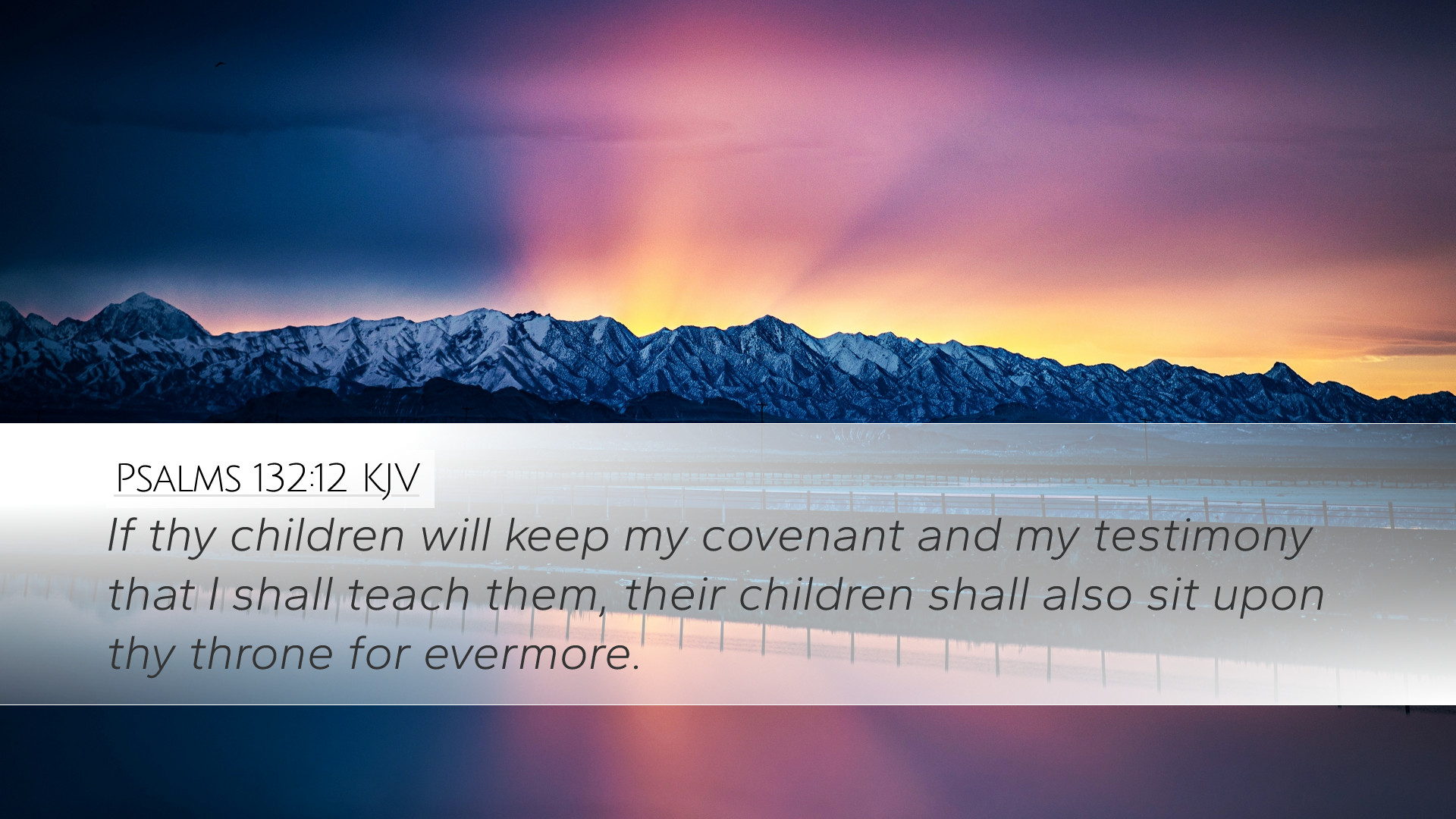Psalms 132:12 - Biblical Commentary
Verse: "If your sons keep my covenant, and my testimonies that I shall teach them, their sons also forever shall sit upon your throne."
Introduction
Psalm 132 is a royal psalm that focuses on the significance of God's covenant with David and the promises made concerning his descendants. Verse 12 serves as a conditional promise, indicating the requirements that must be fulfilled for the blessings of the throne to continue through David's lineage.
Contextual Analysis
The psalm opens with a plea for God to remember David's dedication and the oath he made. This sets the tone for divine intervention and the need for continuity of the Davidic line, reflecting the importance of obedience and faithfulness to God's covenant.
Matthew Henry's Perspective
Matthew Henry emphasizes the covenantal nature of God's promises in this verse. He interprets the conditional statement as an affirmation of the importance of obedience among David's descendants. Henry highlights that God's blessings are contingent upon the faithfulness of Israel, particularly from the line of David.
-
Significance of Covenant: The covenant with David is not merely a promise but a divine commitment that extends to future generations. Henry notes, "The condition of this promise shows that it is a sober, serious business to be entrusted with the gifts and promises of God."
-
Exhortation to Obedience: God makes it clear that while He is committed to His covenant, the response from David’s lineage is crucial. "If your sons keep my covenant," suggests that faithfulness is paramount to sustained blessing.
Albert Barnes' Insights
Albert Barnes provides a nuanced analysis, noting that this promise serves as both a hope and a warning. He argues that the longevity of the Davidic dynasty relies heavily on adherence to God's commandments.
-
Future Generations: Barnes notes that this verse emphasizes not just the present but the future, "their sons also forever shall sit upon your throne." This highlights a divine plan that extends beyond immediate fulfillment.
-
Consequences of Disobedience: Conversely, Barnes points out that failure to uphold God’s covenant can lead to dire consequences, including the potential removal of the monarchy from David’s line, "the condition implies that failing to uphold the covenant will result in forfeiture of the throne."
Adam Clarke's Commentary
Adam Clarke focuses on the theological implications of this promise. He delves into the nature of God's covenant, elaborating on how it represents not only a promise but a moral obligation for David's descendants.
-
Moral Responsibility: Clarke notes the inherent accountability that comes with God's promises, stating, "God's promises are not absolute but are accompanied by conditions that necessitate human response." This indicates a relational dynamic where God's grace invites human responsibility.
-
Messianic Interpretation: Clarke also touches upon the Messianic implications of this verse, viewing it as foreshadowing the ultimate fulfillment in Christ, who is from the line of David. "This promise points toward a greater throne, one that will be established in righteousness," he asserts.
Thematic Reflections
Psalms 132:12 encapsulates several key themes that are crucial for pastors, students, theologians, and scholars:
- The Covenant: Understanding the significance of God's covenant with His people is essential for grasping the overarching narrative of salvation history.
- Obedience and Blessing: The link between faithfulness and divine blessing remains a recurring theme throughout scripture, reminding believers of their call to live in accordance with God's will.
- Legacy: The emphasis on generational responsibility invites reflection on how current actions impact future descendants and the importance of instilling faith values.
- Theological Implications: The intersection of divine sovereignty and human responsibility prompts deep theological engagement, particularly regarding the nature of God's promises and their ramifications.
Conclusion
Psalms 132:12 stands as a critical reminder of the importance of covenant faithfulness. The insights gleaned from the commentaries of Matthew Henry, Albert Barnes, and Adam Clarke illuminate the depths of this verse, emphasizing the need for obedience in light of God's promises. For contemporary believers, this scripture serves as both an encouragement and a challenge to uphold their covenant relationship with God, ensuring that their legacy is marked by faithfulness and devotion.


